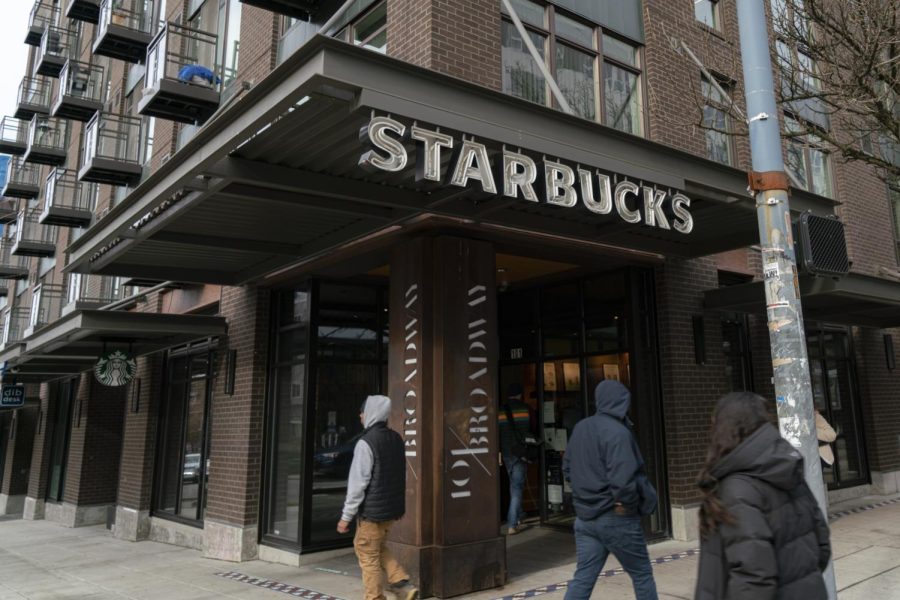Starbucks Workers Attempt to Secure Collective Bargaining Rights
Buffalo, N.Y. captured the attention of coffee drinkers around the country last December when the Elmwood Avenue Starbucks location became the first of the company’s stores to successfully unionize. Soon after, their neighbor on Genesee Street followed. One by one, Starbucks crews around the country have started conducting their own unionization elections.
Like other workers’ movements, Starbucks partners want better rights and protections for themselves than what their corporate offices have allotted them. As the coffee conglomerate’s hometown, Seattle has become the western front of the Starbucks Workers United’s fight.
Shortly after their successes, news of Buffalo’s unions exploded across social media. Word soon reached Starbucks partners attending Seattle University, who have put their jobs on the line to advocate for improvements to their work environments, which they allege to be high-stress environments hindered by limited resources.
One of the baseline changes Starbucks Workers United strives for points to a pattern they illustrated of the company appearing to disregard their employees, who the company calls ‘partners.’
“Starbucks doesn’t let you tip when you use your credit card, and that is something we’ve been complaining about since I’ve been at the company,” student 1 reported. “There’s no reason not to do it. We’ve been saying this for literal years at this point and [Starbucks] still hasn’t done anything, so if they aren’t going to listen, it’s time to unionize.”
To many Starbucks partners and several other food-service employees, the pandemic has revealed some of the shortcomings of the industry. In addition to nationwide labor shortages and global supply-chain disruptions, Starbucks reworked some of their partner policies. While these revisions initially eased pandemic-induced financial tensions, the company later imposed restrictions that rendered their initial sentiment moot.
“During COVID-19, Starbucks enacted a [markout] policy where you can get one free drink and one free food item even if you’re not working, and you can get it at any store,” student 2 explained. “A lot of people benefited from that, especially people who were struggling with other payments. I know some baristas used the extra money for it to go towards car payments,” the source said. “Now instead, you can only get it at your store, within 30 minutes before or after your shift, it’s not as accessible and we still throw away a ridiculous amount of food.”
Further expressing what employees see as a lack of attention to workers, Starbucks continues to enact a variety of policies which union advocates say do not align with the everyday practicality of operating a coffee shop safely and effectively. Incidents that pose danger to partners and customers alike have made creating better precautions a top priority for student 3.
“A lot of the time, we don’t feel safe and we just don’t feel like we’re backed up really. We just recently got security guards and that was after dozens of incidents,” student 3 said.
Over the years, Starbucks has cultivated a specific, expected ambiance in each of their stores. The emphasis on the ambiance of the store was a frustration for one student who reported feeling unsafe in their workplace.
“Starbucks prioritizes stockholders over the actual baristas because they don’t want to put the security guards in the uniform,” student 2 said— they work in one of these locations. “They’re scared they’ll make customers uncomfortable and scare them away. Customers and baristas alike seem to not agree on that.”
The company has also taken a distinct stance on vaccine mandates, requiring them for dine-in customers only. A Starbucks student employee emphasized that they feel unsafe serving unvaccinated customers.
“Most companies say ‘we are a family,’ ‘partners’ is like that sweet spot middle ground where you can almost accept it. Not quite—it’s a lie,” student 2 said, echoing their coworkers’ frustrations.
Student 1 reported struggling for recognition from their corporate superior.
“I have had to force myself to be a partner. I’ve been with the company since 2016 and it’s taken me until this year to feel any amount of recognition,” student 1 proclaimed. “That’s only because I’ve started calling out laws, calling out rights, things like that.”
While not all workers want to unionize, it is common among Starbucks partners to desire easier channels of communication across all levels of the company.
“Even the baristas who don’t particularly want a union would appreciate an honest approach,” student 1 said. “If you remember when the food markouts went away and then they posted ‘we heard you, you said you wanted this to go away,’ literally no barista wanted the markout system to go away during COVID-19.”
Starbucks’ corporate teams have coordinated union-busting efforts in the past, with upper management at stores rumored to be involved in the movement. Ranging from ‘vote no’ texts to intimidating union organizers with write-ups, the company’s anti-union stance raises questions for employees about the value they assign to each partner.
After establishing their importance to the company overall, unionized stores plan to enact changes that directly improve the care and resources available to their partners.
“At every store I’ve been at, just because I’ve covered so many different stores, I have enough experience to say this. I know what the general issues are with Starbucks baristas. They’re not things that can be fixed on a store-by-store basis. They’re also not things that can be fixed without an argument. Our partners need to be protected and educated on these kinds of things, they deserve to have somebody to advocate for them,” student 1 said.
Not all partners are aware of the protections they have or resources at their disposal. Advocates state that forming a union provides an opportunity for partners to educate each other on their rights and foster their own healthy work environment.
“We can’t be partners with corporate unless we actually get a say,” student 2 said.


